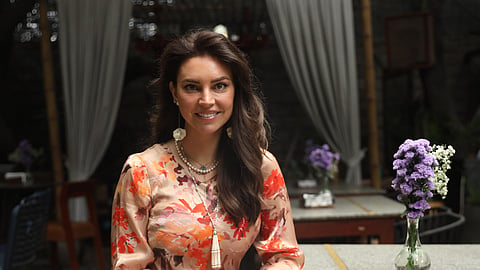Sarah Todd: Apricot delight is my favourite Hyderabadi treat
Australian chef Sarah Todd is a woman of many talents. A celebrated chef, model, restaurateur, and cookbook author, Sarah’s passion for food has taken her to remarkable heights, gaining fame after her appearance on MasterChef Australia in 2014. With a love for travel and an insatiable curiosity for global cuisines, her fondness for Indian flavours shines through in her culinary journey. During her recent trip to Hyderabad to pay a visit to her food venture, The Sanctuary Bar & Kitchen, Sarah indulged in the city’s vibrant food scene. In an exclusive chat with Indulge, she shares her love for Hyderabadi delicacies, offers delightful anecdotes from her journey, and reveals the driving forces behind her continued work in the world of gastronomy.
Sarah, welcome to Hyderabad! How do you feel about coming back to the city?
I absolutely love it here and am so grateful to be part of this experience. Having spent a significant amount of time in Hyderabad, the first thing I did upon arriving was dive into the heart and soul of the city by embarking on food trips and indulging in local dishes. The culture here is incredibly warm and inviting, and I truly enjoy every moment spent in this vibrant city.
What is it about India, and specifically Hyderabad, that keeps pulling you back? How do you feel about the city’s iconic dishes, biryani and Haleem?
Every time I visit a city in India, I discover new favourites, but in Hyderabad, Apricot delight is irresistible — its blend of creamy apricot jam and cake is unlike any dessert I’ve had. Hyderabadi biryani also fascinates me with its intricate cooking technique, and after learning from an expert, I can’t wait to recreate it for my loved ones back in Australia. Haleem, too, is a marvel — a perfect fusion of flavours and textures. Hyderabad’s culinary treasures are truly one-of-a-kind, adding to the city’s undeniable allure.
Can you tell us how your passion for food and cooking began?
I come from a line of strong women, and every day at 6.30 pm, our family would gather to enjoy a home-cooked meal. Despite our busy lives, my mom always made it a priority to cook for us, and it’s a tradition I try to uphold, even when work gets overwhelming. Sharing a homemade meal with my son is something I cherish deeply — it’s a special and important part of my day.
You often use local ingredients and give them a contemporary twist with your unique style, creating fusion treats. Why?
My focus is on local ingredients and cuisines for two key reasons — environmental sustainability and freshness. Using local produce reduces our carbon footprint and allows us to serve the freshest ingredients. As someone from another country, I feel it’s essential to appreciate and embrace the local culture and produce.
We’ve often heard you mention that you blend Indian flavours with French techniques in your dishes. Could you elaborate?
Looking back, I remember how the phrase ‘finding your own style’ was often emphasised upon. While anyone can follow a recipe, it’s adding a personal touch that truly connects the dish to you. It took me some time to realise my passion, but experimenting with flavours and techniques helped me find joy in cooking. A turning point came on MasterChef when I created an Indian-inspired lobster dish using French techniques, which was praised as a 3 Michelin star dish. That moment solidified my belief that this is my true calling.
Have you observed any gender inequalities in the culinary industry?
There is indeed a noticeable gap. While many female chefs are joining the culinary industry worldwide, there seems to be a disparity in high-level positions, such as head chefs. The exact reasons for this imbalance remain unclear, and despite the growing presence of women in the field, these top roles still see a limited female representation.
As an author, how do you approach simplifying cooking techniques and recipes in your books to make them more accessible and encouraging for readers?
Cookbooks can differ in complexity, but mine are designed to make Indian cuisine more accessible to Australians by simplifying the process. I know that the variety of ingredients and spices can feel overwhelming, so I aimed to show that Indian cooking can be easy with straightforward recipes. I, too, was initially overwhelmed, but over time, I learned the spice combinations and regional variations, which made it much simpler.
How has Indian food influenced your style of cooking?
For me, not just in the sense of creating recipes, but exploring Indian food has helped me in developing a palette.
In a competitive food industry, what drives a chef to keep pushing forward?
I think it’s very important to stay excited and you have to love what you do. The competitiveness is one thing, but I believe in hard work. The restaurant or food industry is constantly evolving and it’s a lot about creativity, consistency, quality of food. You have to create interesting stuff that people keep coming back to.
Any messages for budding chefs?
Entering the culinary industry is highly rewarding but demands a strong commitment. Success in this field is highly competitive, requiring chefs to put in extra hours and continually refine their skills. Working in a restaurant provides valuable experience, but it’s crucial to also invest in personal growth and craft improvement.
Catch the podcast here!

